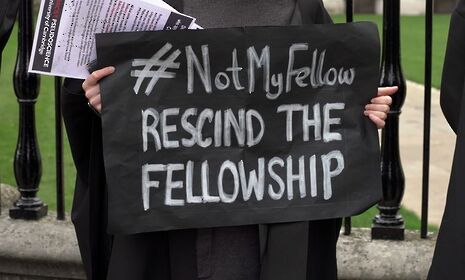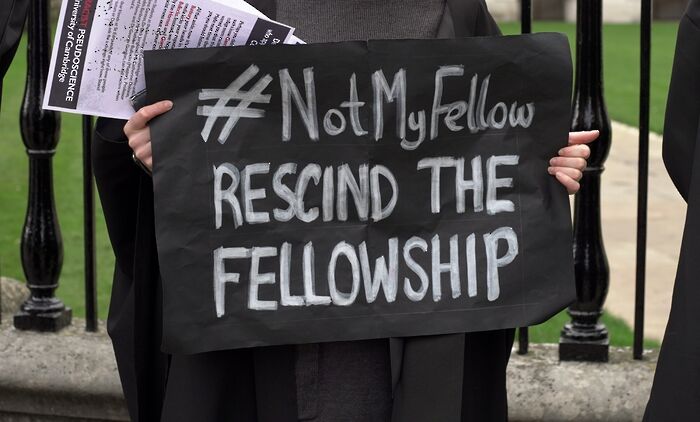Senior Eddie’s fellow found ‘potential failures of disclosure’ by Noah Carl during college appointment process
A fellow of St Edmund’s has suggested that Carl did not reveal several articles he published when he was applying to a research fellowship in order to “downplay their existence”

The full report of one of St. Edmund’s investigations into the appointment of Dr Noah Carl has revealed new details around his appointment process, including that a senior Eddie’s fellow has suggested there were “potential failures of disclosure” of Carl’s academic papers and of his participation in the London Conference on Intelligence — a secret eugenics conference previously held at UCL.
The review, led by retired Lord Justice of Appeal Sir Patrick Elias, has argued that despite Carl’s non-disclosure, there was “no material failure on [his] part”, as there is no legal duty for job applicants “to disclose information which might undermine his application”. However, the senior fellow has suggested that Carl’s omission of these details was in an attempt to “downplay their existence”.
Furthermore the report, submitted to the college’s governing body and obtained by Varsity through a Freedom of Information Act request, has recommended that they adopt a policy of “making full disclosure an express requirement” of research fellow applicants.
The report also found that Carl was the only short-listed candidate to have his work assessed by one academic external to the Nominations Committee — while all other candidates had two assessors — due to one potential assessor not having responded to the college’s request.
Also detailed are several actions which members of the Committee had not been obligated to take, but which were available to them during the appointment process and which would have revealed the nature of Carl’s past work and connections. Listed on Carl’s CV was a link to his personal blog, where several posts draw direct attention to his published articles on OpenPsych, which have been criticised by academics and students as “ethically suspect and methodologically flawed”.
Furthermore according to the review, “only one of the fellows on the Nominations Committee had googled Dr Carl but he did not turn up anything which caused him concern”. However, a New Statesman article, published “over two weeks before Dr Carl’s interview”, had “specifically [drawn] attention to the fact that Dr Carl had been a participant” at the London Conference on Intelligence.
The Elias report also notes that “it is said that it is obvious, even a cursory reading of some of [Carl’s] papers, that many are racist and Islamophobic and that the methodology is inadequate and often confuses correlation and causation” – which the report does not pass a judgement on but which was upheld in the Herrtage review, according to its summary by the college. It also notes that googling Carl would have revealed his links with the London Conference on Intelligence and controversial blogger Emil Kirkegaard.
It concluded that no senior staff in college “acted negligently or without due diligence” in selecting Carl, rejecting concerns by students and academics that “the appointment process for this fellowship was not carried out with the degree of academic rigour, diligence and respect for principles of equality and diversity that we would expect.”
Members of St Edmund’s CR took their concerns to the college about Carl’s work attempting to link race, criminality, and IQ in November, and an open letter condemning Carl’s appointment has been signed by over 586 academics. The college commissioned two investigations into Dr Carl — the findings of which led to the firing of Noah Carl in late April.
Citing personal data protections, the college has not released a similarly redacted version of the internal investigation chaired by Emeritus Fellow Professor Michael Herrtage which concluded a “poor scholarship of this problematic body of Dr Carl’s work”.
Varsity has contacted Dr Noah Carl for comment on the findings of the report.
Despite the report’s conclusion that there was no negligence by the college, it has recommended several changes to the college’s hiring procedures, including that the Nominations Committee google the chosen or shortlisted candidates, establish links with the relevant university department or faculty of the fellow, and make full disclosure by candidates “an express requirement”.
In a statement to Varsity, a spokesperson for the college said: “The College has accepted the Elias report and is conducting a review in accordance with the recommendations.”
- Updated, 21st June: This article was edited to clarify that the Elias review deferred to the Herrtage report on judging research practices of Carl’s past papers
 News / Colleges charge different rents for the same Castle Street accommodation2 March 2026
News / Colleges charge different rents for the same Castle Street accommodation2 March 2026 News / News in Brief: waterworks, wine woes, and workplace wins 1 March 2026
News / News in Brief: waterworks, wine woes, and workplace wins 1 March 2026 News / Climate activists protest for ‘ethical careers policy’1 March 2026
News / Climate activists protest for ‘ethical careers policy’1 March 2026 News / Angela Merkel among Cambridge honorary degree nominees27 February 2026
News / Angela Merkel among Cambridge honorary degree nominees27 February 2026 News / Private school teacher who lied about Cambridge degree barred from teaching27 February 2026
News / Private school teacher who lied about Cambridge degree barred from teaching27 February 2026











